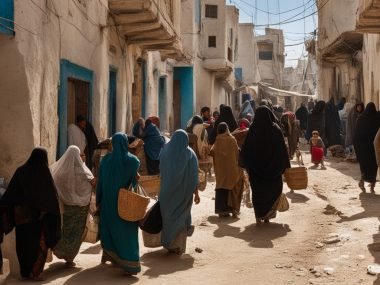Are you aware of the travel warnings for Tunisia? The Foreign, Commonwealth & Development Office (FCDO) says it’s risky. It points to terrorist threats and military ops in places like the Chaambi Mountains. Also, spots near the borders with Algeria and Libya are dangerous. This includes areas like Mount Salloum and Jendouba. Knowing these travel bans is vital if you’re planning a trip.
Key Takeaways
- The FCDO advises against all travel to key regions in Tunisia due to terrorism and military operations.
- High-risk areas include Chaambi Mountains National Park and parts along the Tunisia-Algeria and Tunisia-Libya borders.
- Governorates such as Jendouba and Kasserine are included in the travel restrictions.
- Travel insurance may not be valid if travelling against FCDO advice.
- Staying updated with FCDO travel advice through social media and email alerts is recommended.
Current Travel Advisory For Tunisia
The Foreign, Commonwealth & Development Office (FCDO) has updated its advice. It’s crucial to listen to the Tunisia travel advisory. Tunisia is interesting but remember, there are travel and safety rules.
FCDO Travel Advice
The FCDO does not recommend going to Western Tunisia. This includes the Tunisia-Algeria border areas and Chaambi Mountains National Park. The same goes for places near the Libya border in Southern Tunisia. These Tunisia travel bans are due to terror risks and military actions.
Areas With Travel Warnings
Some places like Mount Salloum, Mount Sammamma, and Mount Mghila are too risky. The FCDO says to avoid travel near these places unless it’s very important. It’s important to know that no trip is completely safe. Stay updated with the FCDO’s Tunisia travel advisory to make smart choices.
Always keep up with the latest safety news in Tunisia. Stay informed with official advice. Be ready for quick changes.
Entry Requirements For British Nationals
British nationals need to know certain rules before going to Tunisia. Understanding Tunisia entry requirements helps make entry smooth.
COVID-19 Restrictions
There are no COVID-19 tests or vaccine rules for going into Tunisia now. You can enter without worrying about COVID-19 papers. Still, it’s good to keep up with any new rules.
Passport Validity
Your passport validity must last for your whole trip. Make sure your passport is valid so you won’t have travel troubles. If not, you might not be allowed in, ruining your plans.
Visa Requirements
British nationals don’t need a visa for stays up to 90 days, which is great news. Make sure your passport gets stamped when you enter and leave. This avoids fines for staying too long.
You might also need to give contact details, show your return ticket, and where you’re staying. Be ready for border delays, especially if your name is similar to ones on their lists. This is a common issue for British nationals of South Asian family background.
Following these rules will help make your Tunisia trip smooth and fun. It keeps you away from unexpected problems.
Regional Risks And Safety Precautions
When you travel to Tunisia, you need to be extra careful. The U.S. Department of State has warned U.S. citizens. They say it’s important to know about the risky places there. This advice is also very important for British people wanting to visit those areas.
High-Risk Areas
Some places in Tunisia are very dangerous. They might have terrorists who do not like Westerners. The areas next to Algeria and Libya are the most dangerous ones. Military zones and some national parks are places you should not go to without care. The U.S. Embassy tells its people to say before they go to these places. British people should be just as cautious.
“We advise heightened caution for all those planning to visit these regions,” stated the U.S. Department of State.

Specific Regional Advisories
If you’re British and going to Tunisia, you should keep up with the news. The advisories will tell you about the dangerous areas. It helps you know and decide where it’s safe to go. Especially near the borders with Algeria and Libya.
| Region | Risk Level | Advisory Details |
|---|---|---|
| Algeria Border Areas | High | Travel to these regions is highly discouraged unless necessary. |
| Libya Border Areas | High | Similar high-risk advisories apply due to increased volatility. |
| Military Zones | Restricted | Travel requires special permissions and notifications. |
| National Parks | Variable | Check specific advisories before planning a visit. |
Health and Medical Recommendations
Before you go to Tunisia, you need to check health rules and needed shots. TravelHealthPro says it’s key to look at what health steps you must follow. They also say to get protective vaccinations to avoid health risks.
Vaccination Requirements
TravelHealthPro suggests keeping your usual vaccinations up to date. This means shots like MMR (Measles, Mumps, Rubella) and DPT (Diphtheria, Pertussis, Tetanus). They also strongly suggest getting shots for Hepatitis A and Typhoid. This is due to the risk from bad food and water.
Availability of Medical Care
Finding medical help in Tunisia can be hit or miss. In big cities like Tunis, hospitals are good and can handle a lot. But, if you go to less populated areas, it might be hard to find help quickly. It’s good to keep this in mind for travel plans.
If you’re going to the desert, tell someone your plan early. The Tunisian National Guard needs to know if you’re going south of Remada for safety. Knowing health rules and getting the right vaccinations helps a lot. It makes your stay in Tunisia safer and more fun.
Tunisia’s Quarantine Rules
Right now, Tunisia doesn’t have strict quarantine rules for travelers. There aren’t any must-do quarantine steps. But, it’s very important to keep up with any new rules about quarantine in Tunisia, as they can change fast.
Even though Tunisia’s quarantine rules seem easy now, stay alert for any updates. Always check official sources for the newest info before you make travel plans. Regularly looking at government advisories helps avoid unexpected changes to your trip.
In short, there are currently no quarantine rules in Tunisia, which is good news for visitors. However, because health guidelines around the world can change, staying informed and ready is essential for smooth travel.
Customs and Currency Regulations
When you go to Tunisia, knowing about customs and money rules is important. This helps you travel with ease. Make sure to follow these rules to avoid problems when you arrive or leave.
Bringing Money In and Out of Tunisia
You must tell officials if you bring more than 10,000 Tunisian dinars or its value in other money. You cannot take Tunisian dinars out of the country. To change dinars back to pounds or another currency, show bank receipts. Not following these rules could lead to fines or losing your money.
| Action | Requirement |
|---|---|
| Declare Foreign Currencies | Required for amounts exceeding 10,000 Tunisian dinars or equivalent |
| Exporting Tunisian Dinars | Strictly prohibited |
| Currency Conversion | Bank receipts required for conversions |

Rules On Drones And Other Restricted Items
Tunisia has strict rules about bringing drones in. You need permission to bring drones, or they could be taken until you leave. Knowing and following the rules on drones helps avoid trouble and keeps your items safe.
Apart from drones, things like some medicines, guns, and old items have strict rules. Always check with Tunisian customs to make sure you follow their rules on drones and other items.
Security Measures And Crime Prevention
The world sees more threats from terrorism today. This shows we need strong security and smart crime prevention when travelling.
Terrorism Threats
Terrorism threats are on the rise, from groups like ISIS and AQIM. Important places like public events, hotels, and shopping spots could be targets. It’s vital to watch out and tell the local police if you see anything odd.
Common Crimes And How to Avoid Them
Thieves and pickpockets often target tourists. Here are tips to stay safe:
- Keep your valuables in a hotel safe when not needed.
- Don’t show off money or expensive things in public.
- Be careful in quiet places and try to not be alone.
Travel Safety Tips
If a crime happens to you, tell the local police right away. Get help from your embassy too. Following safety advice like knowing your way around in advance makes trips better. Stay up to date with reliable news.
What Are The Travel Restrictions To Tunisia?
It’s key to keep up with Tunisia travel regulations for a safe trip. The rules mostly come from security issues.
Travelling to some areas in Tunisia might not be safe. This is because of possible terrorist acts. Places like the Chaambi Mountains National Park should be avoided. The same goes for areas next to the Tunisia-Algeria border, such as Mount Salloum and Mount Sammamma.
Some governorates like Jendouba and Kasserine are also seen as dangerous. This is true for places near the Tunisia-Libya border too. These rules mean travellers need to be very alert and always check for updates.
Remember, your travel insurance may not cover you if you go against advice. Always check updates from trusted sources like the FCDO. You can get email alerts or follow them on social media for news.
Tunisia Travel Updates
It’s essential to keep up with new travel rules in Tunisia. This is because the country’s political and security situation can change quickly. Thus, advisories and restrictions may be updated without much warning.
Latest Changes To Travel Regulations
Travellers must know that Tunisia’s travel rules can change fast. Recent updates might include safety measures, security advice, entry needs, and health tips. These updates help keep everyone safe. Always check these rules before planning your trip.
How To Stay Informed
To stay updated with Tunisia’s latest travel news, signing up for email alerts from the FCDO is a good idea. Following the FCDO on social media also helps get news quickly. This way, you can make safer travel choices and adjust to any changes while in Tunisia.
Planning Your Trip: Insurance And Precautions
When you plan a trip to Tunisia, getting good travel insurance is a must. It should cover medical issues, trip cancellations, and surprises. This gives you comfort while you travel.
Travel Insurance Importance
The need for travel insurance cannot be too much emphasised. Not having it can mean big bills if surprises happen. Make sure your policy covers everything you want to do. Also, check if it excludes things because of past health issues.
Pre-Travel Precautions
It’s important to take steps before you travel for a smooth journey. Start by learning about your destination. Know the culture, laws, and what’s normal there.
Be sure you’re up to date with shots. Put together a health kit. It should have medicines, bug spray, and basic first aid items. Also, tell your bank you’re travelling to keep your cards working.
Conclusion
As we finish, we see how important it is to follow travel rules and stay updated on Tunisia. Checking the latest FCDO advisories often is key. It helps you make smart choices and stay safe.
Planning your trip well is also crucial. Make sure you have travel insurance that covers everything. Also, get any needed vaccinations and learn about local ways. This helps you avoid problems.
Being well-informed and careful makes your trip better. Following these tips keeps you safe and makes your Tunisia trip great. By looking after your safety and getting ready, you’re all set for a fun adventure.







